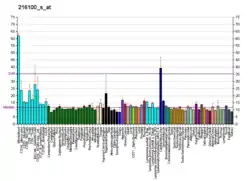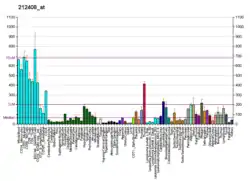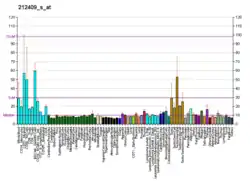TOR1AIP1
Torsin-1A-interacting protein 1 is a protein that in humans is encoded by the TOR1AIP1 gene.[5][6][7] More commonly known as lamina associated polypeptide 1 (LAP1), it is a type II integral membrane protein that resides in the inner nuclear membrane. The luminal domain of LAP1 interacts with Torsin A and is necessary for the ATPase activity of Torsin A. LAP1 plays a critical role in skeletal and heart muscle.[8][9] Mutations in TOR1AIP1 have been linked to muscular dystrophy and cardiomyopathy.[10][11] It's deletion from mouse hepatocytes leads to defected very-low density lipoprotein secretion and causes non-alcoholic fatty liver disease and non-alcoholic steatohepatitis[12]
References
- GRCh38: Ensembl release 89: ENSG00000143337 - Ensembl, May 2017
- GRCm38: Ensembl release 89: ENSMUSG00000026466 - Ensembl, May 2017
- "Human PubMed Reference:". National Center for Biotechnology Information, U.S. National Library of Medicine.
- "Mouse PubMed Reference:". National Center for Biotechnology Information, U.S. National Library of Medicine.
- Kondo Y, Kondoh J, Hayashi D, Ban T, Takagi M, Kamei Y, Tsuji L, Kim J, Yoneda Y (Jun 2002). "Molecular cloning of one isotype of human lamina-associated polypeptide 1s and a topological analysis using its deletion mutants". Biochem Biophys Res Commun. 294 (4): 770–8. doi:10.1016/S0006-291X(02)00563-6. PMID 12061773.
- Goodchild RE, Dauer WT (Mar 2005). "The AAA+ protein torsinA interacts with a conserved domain present in LAP1 and a novel ER protein". J Cell Biol. 168 (6): 855–62. doi:10.1083/jcb.200411026. PMC 2171781. PMID 15767459.
- "Entrez Gene: TOR1AIP1 torsin A interacting protein 1".
- Shin JY, Méndez-López I, Wang Y, Hays AP, Tanji K, Lefkowitch JH, Schulze PC, Worman HJ, Dauer WT. (2013) Lamina-associated polypeptide-1 interacts with the muscular dystrophy protein emerin and is essential for skeletal muscle maintenance. Dev Cell. 26:591-603. doi: 10.1016/j.devcel.2013.08.012.
- Shin JY, Le Dour C, Sera F, Iwata S, Homma S, Joseph LC, Morrow JP, Dauer WT, Worman HJ. (2014) Depletion of lamina-associated polypeptide 1 from cardiomyocytes causes cardiac dysfunction in mice. Nucleus. 5:260-459. doi: 10.4161/nucl.29227.
- Kayman-Kurekci G, Talim B, Korkusuz P, Sayar N, Sarioglu T, Oncel I, Sharafi P, Gundesli H, Balci-Hayta B, Purali N, Serdaroglu-Oflazer P, Topaloglu H, Dincer P. (2014) Mutation in TOR1AIP1 encoding LAP1B in a form of muscular dystrophy: a novel gene related to nuclear envelopathies. Neuromuscul Disord. 24:624-33. doi: 10.1016/j.nmd.2014.04.007
- Ghaoui R, Benavides T, Lek M, Waddell LB, Kaur S, North KN, MacArthur DG, Clarke NF, Cooper ST. (2016) TOR1AIP1 as a cause of cardiac failure and recessive limb-girdle muscular dystrophy. Neuromuscul Disord. 26:500-503. doi: 10.1016/j.nmd.2016.05.013.
- Shin JY, Hernandez-Ono A, Fedotova T, Östlund C, Lee MJ, Gibeley SB, Liang CC, Dauer WT, Ginsberg HN, Worman HJ. (2019) Nuclear envelope-localized torsinA-LAP1 complex regulates hepatic VLDL secretion and steatosis. J Clin Invest. 130:4885-4900. doi: 10.1172/JCI129769.
Further reading
- Foisner R, Gerace L (1993). "Integral membrane proteins of the nuclear envelope interact with lamins and chromosomes, and binding is modulated by mitotic phosphorylation". Cell. 73 (7): 1267–79. doi:10.1016/0092-8674(93)90355-T. PMID 8324822.
- Maison C, Pyrpasopoulou A, Theodoropoulos PA, Georgatos SD (1997). "The inner nuclear membrane protein LAP1 forms a native complex with B-type lamins and partitions with spindle-associated mitotic vesicles". EMBO J. 16 (16): 4839–50. doi:10.1093/emboj/16.16.4839. PMC 1170119. PMID 9305626.
- Strausberg RL, Feingold EA, Grouse LH, et al. (2003). "Generation and initial analysis of more than 15,000 full-length human and mouse cDNA sequences". Proc. Natl. Acad. Sci. U.S.A. 99 (26): 16899–903. doi:10.1073/pnas.242603899. PMC 139241. PMID 12477932.
- Ota T, Suzuki Y, Nishikawa T, et al. (2004). "Complete sequencing and characterization of 21,243 full-length human cDNAs". Nat. Genet. 36 (1): 40–5. doi:10.1038/ng1285. PMID 14702039.
- Gerhard DS, Wagner L, Feingold EA, et al. (2004). "The Status, Quality, and Expansion of the NIH Full-Length cDNA Project: The Mammalian Gene Collection (MGC)". Genome Res. 14 (10B): 2121–7. doi:10.1101/gr.2596504. PMC 528928. PMID 15489334.
- Rual JF, Venkatesan K, Hao T, et al. (2005). "Towards a proteome-scale map of the human protein-protein interaction network". Nature. 437 (7062): 1173–8. Bibcode:2005Natur.437.1173R. doi:10.1038/nature04209. PMID 16189514. S2CID 4427026.
- Gregory SG, Barlow KF, McLay KE, et al. (2006). "The DNA sequence and biological annotation of human chromosome 1". Nature. 441 (7091): 315–21. Bibcode:2006Natur.441..315G. doi:10.1038/nature04727. PMID 16710414.
- Olsen JV, Blagoev B, Gnad F, et al. (2006). "Global, in vivo, and site-specific phosphorylation dynamics in signaling networks". Cell. 127 (3): 635–48. doi:10.1016/j.cell.2006.09.026. PMID 17081983. S2CID 7827573.
This article is issued from Wikipedia. The text is licensed under Creative Commons - Attribution - Sharealike. Additional terms may apply for the media files.






